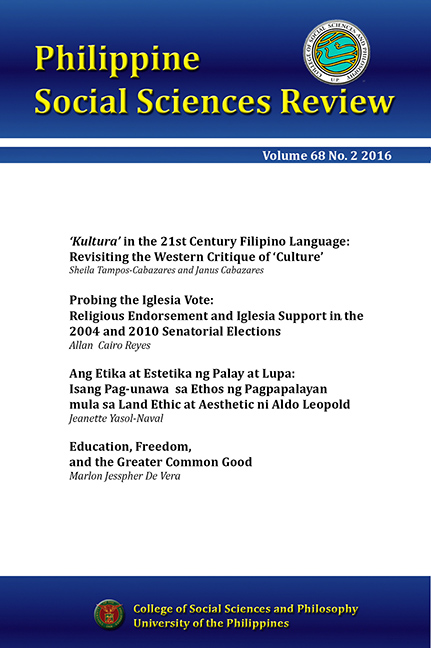Probing the Iglesia Vote: Religious Endorsement and Iglesia Support in the 2004 and 2010 Senatorial Elections
Abstract
The Iglesia Ni Cristo (Church of Christ) has had considerable influence in Philippine politics following the so-called EDSA Revolution of 1986. This is evident in the success of its candidate endorsement in elections, which has elicited allegations of the religious sect engaging in bloc voting. This phenomenon invites an enquiry into the efficacy of these endorsements. How potent is an Iglesia endorsement? To answer this question, this study obtained measures of Iglesia support (Iglesia ni Cristo vote share) using 2004 and 2010 exit poll data for senators and analyzed these with Iglesia ni Cristo candidate endorsement data and candidate popularity ratings. Ordinary Least Squares and logistic regression models were estimated to determine which variables really command votes from members of the Iglesia Ni Cristo, as well as to gauge whether or not candidate popularity is the primary consideration in the organization’s endorsement. Findings suggest that while both endorsements and popularity produce INC votes, an Iglesia endorsement is contingent upon the candidates’ projected winning margins. Moreover, there is a positive relationship between candidate popularity and the likelihood of an INC endorsement.
Published
2017-03-05
How to Cite
REYES, Allan Cairo.
Probing the Iglesia Vote: Religious Endorsement and Iglesia Support in the 2004 and 2010 Senatorial Elections.
Philippine Social Sciences Review, [S.l.], mar. 2017.
ISSN 2672-3158.
Available at: <https://journals.upd.edu.ph/index.php/pssr/article/view/5569>. Date accessed: 28 sep. 2025.
Section
Articles
Keywords
bloc vote, endorsement, Iglesia ni Cristo, Philippine elections, Philippine politics


